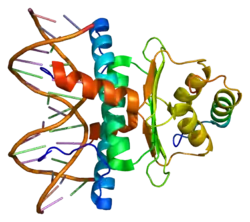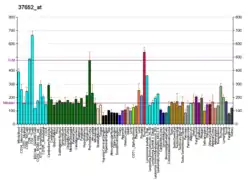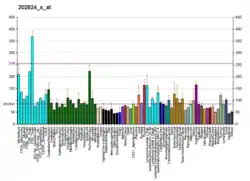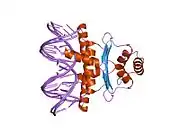CABIN1
Calcineurin-binding protein cabin-1 is a protein that in humans is encoded by the CABIN1 gene.[5][6][7]
Function
Calcineurin plays an important role in the T-cell receptor-mediated signal transduction pathway. The protein encoded by this gene binds specifically to the activated form of calcineurin and inhibits calcineurin-mediated signal transduction. The encoded protein is found in the nucleus and contains a leucine zipper domain as well as several PEST motifs, sequences which confer targeted degradation to those proteins which contain them. At least four alternatively spliced transcripts have been found for this gene, but the full-length nature of most of them has not been determined.[7]
Interactions
CABIN1 has been shown to interact with:
References
- ENSG00000281670 GRCh38: Ensembl release 89: ENSG00000099991, ENSG00000281670 - Ensembl, May 2017
- GRCm38: Ensembl release 89: ENSMUSG00000020196 - Ensembl, May 2017
- "Human PubMed Reference:". National Center for Biotechnology Information, U.S. National Library of Medicine.
- "Mouse PubMed Reference:". National Center for Biotechnology Information, U.S. National Library of Medicine.
- Sun L, Youn HD, Loh C, Stolow M, He W, Liu JO (Jun 1998). "Cabin 1, a negative regulator for calcineurin signaling in T lymphocytes". Immunity. 8 (6): 703–11. doi:10.1016/S1074-7613(00)80575-0. PMID 9655484.
- Nagase T, Ishikawa K, Nakajima D, Ohira M, Seki N, Miyajima N, Tanaka A, Kotani H, Nomura N, Ohara O (Apr 1997). "Prediction of the coding sequences of unidentified human genes. VII. The complete sequences of 100 new cDNA clones from brain which can code for large proteins in vitro". DNA Research. 4 (2): 141–50. doi:10.1093/dnares/4.2.141. PMID 9205841.
- "Entrez Gene: CABIN1 calcineurin binding protein 1".
- Lai MM, Luo HR, Burnett PE, Hong JJ, Snyder SH (Nov 2000). "The calcineurin-binding protein cain is a negative regulator of synaptic vesicle endocytosis". The Journal of Biological Chemistry. 275 (44): 34017–20. doi:10.1074/jbc.C000429200. PMID 10931822.
- Han A, Pan F, Stroud JC, Youn HD, Liu JO, Chen L (Apr 2003). "Sequence-specific recruitment of transcriptional co-repressor Cabin1 by myocyte enhancer factor-2". Nature. 422 (6933): 730–4. doi:10.1038/nature01555. PMID 12700764.
- Youn HD, Sun L, Prywes R, Liu JO (Oct 1999). "Apoptosis of T cells mediated by Ca2+-induced release of the transcription factor MEF2". Science. 286 (5440): 790–3. doi:10.1126/science.286.5440.790. PMID 10531067.
- Youn HD, Liu JO (Jul 2000). "Cabin1 represses MEF2-dependent Nur77 expression and T cell apoptosis by controlling association of histone deacetylases and acetylases with MEF2". Immunity. 13 (1): 85–94. doi:10.1016/s1074-7613(00)00010-8. PMID 10933397.
Further reading
- Liu JO (Nov 2003). "Endogenous protein inhibitors of calcineurin". Biochemical and Biophysical Research Communications. 311 (4): 1103–9. doi:10.1016/j.bbrc.2003.10.020. PMID 14623296.
- Laherty CD, Yang WM, Sun JM, Davie JR, Seto E, Eisenman RN (May 1997). "Histone deacetylases associated with the mSin3 corepressor mediate mad transcriptional repression". Cell. 89 (3): 349–56. doi:10.1016/S0092-8674(00)80215-9. PMID 9150134.
- Youn HD, Sun L, Prywes R, Liu JO (Oct 1999). "Apoptosis of T cells mediated by Ca2+-induced release of the transcription factor MEF2". Science. 286 (5440): 790–3. doi:10.1126/science.286.5440.790. PMID 10531067.
- Dunham I, Shimizu N, Roe BA, Chissoe S, Hunt AR, Collins JE, Bruskiewich R, Beare DM, Clamp M, Smink LJ, Ainscough R, Almeida JP, Babbage A, Bagguley C, Bailey J, Barlow K, Bates KN, Beasley O, Bird CP, Blakey S, Bridgeman AM, Buck D, Burgess J, Burrill WD, O'Brien KP (Dec 1999). "The DNA sequence of human chromosome 22". Nature. 402 (6761): 489–95. doi:10.1038/990031. PMID 10591208.
- Youn HD, Grozinger CM, Liu JO (Jul 2000). "Calcium regulates transcriptional repression of myocyte enhancer factor 2 by histone deacetylase 4". The Journal of Biological Chemistry. 275 (29): 22563–7. doi:10.1074/jbc.C000304200. PMID 10825153.
- Lai MM, Luo HR, Burnett PE, Hong JJ, Snyder SH (Nov 2000). "The calcineurin-binding protein cain is a negative regulator of synaptic vesicle endocytosis". The Journal of Biological Chemistry. 275 (44): 34017–20. doi:10.1074/jbc.C000429200. PMID 10931822.
- Youn HD, Liu JO (Jul 2000). "Cabin1 represses MEF2-dependent Nur77 expression and T cell apoptosis by controlling association of histone deacetylases and acetylases with MEF2". Immunity. 13 (1): 85–94. doi:10.1016/S1074-7613(00)00010-8. PMID 10933397.
- Esau C, Boes M, Youn HD, Tatterson L, Liu JO, Chen J (Nov 2001). "Deletion of calcineurin and myocyte enhancer factor 2 (MEF2) binding domain of Cabin1 results in enhanced cytokine gene expression in T cells". The Journal of Experimental Medicine. 194 (10): 1449–59. doi:10.1084/jem.194.10.1449. PMC 2193671. PMID 11714752.
- Han A, Pan F, Stroud JC, Youn HD, Liu JO, Chen L (Apr 2003). "Sequence-specific recruitment of transcriptional co-repressor Cabin1 by myocyte enhancer factor-2". Nature. 422 (6933): 730–4. doi:10.1038/nature01555. PMID 12700764.
- Tagami H, Ray-Gallet D, Almouzni G, Nakatani Y (Jan 2004). "Histone H3.1 and H3.3 complexes mediate nucleosome assembly pathways dependent or independent of DNA synthesis". Cell. 116 (1): 51–61. doi:10.1016/S0092-8674(03)01064-X. PMID 14718166.
- Rodríguez A, Martínez-Martínez S, López-Maderuelo MD, Ortega-Pérez I, Redondo JM (Mar 2005). "The linker region joining the catalytic and the regulatory domains of CnA is essential for binding to NFAT". The Journal of Biological Chemistry. 280 (11): 9980–4. doi:10.1074/jbc.C400401200. PMID 15671033.
- Li XN, Li YL, Liu GB, Ding YQ (Jan 2005). "Selection of choriocarcinoma-associated genes using bioinformatics". Di 1 Jun Yi Da Xue Xue Bao = Academic Journal of the First Medical College of PLA. 25 (1): 1–6. PMID 15683985.
- Pan F, Means AR, Liu JO (Jun 2005). "Calmodulin-dependent protein kinase IV regulates nuclear export of Cabin1 during T-cell activation". The EMBO Journal. 24 (12): 2104–13. doi:10.1038/sj.emboj.7600685. PMC 1150881. PMID 15902271.
- Jang H, Cho EJ, Youn HD (Jul 2007). "A new calcineurin inhibition domain in Cabin1". Biochemical and Biophysical Research Communications. 359 (1): 129–35. doi:10.1016/j.bbrc.2007.05.066. PMID 17531200.
External links
- Human CABIN1 genome location and CABIN1 gene details page in the UCSC Genome Browser.
- Human KB-318B8.7 genome location and KB-318B8.7 gene details page in the UCSC Genome Browser.
This article is issued from Wikipedia. The text is licensed under Creative Commons - Attribution - Sharealike. Additional terms may apply for the media files.







